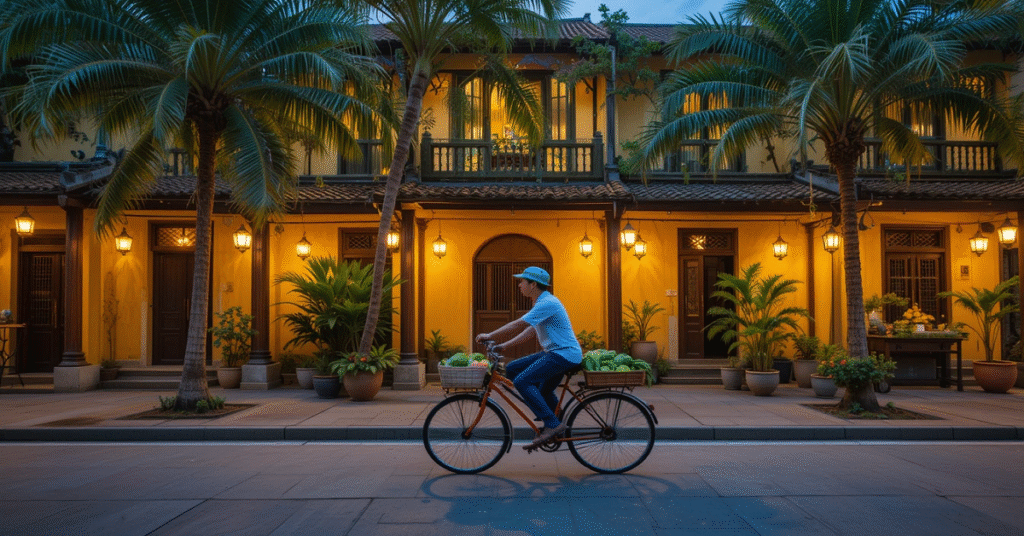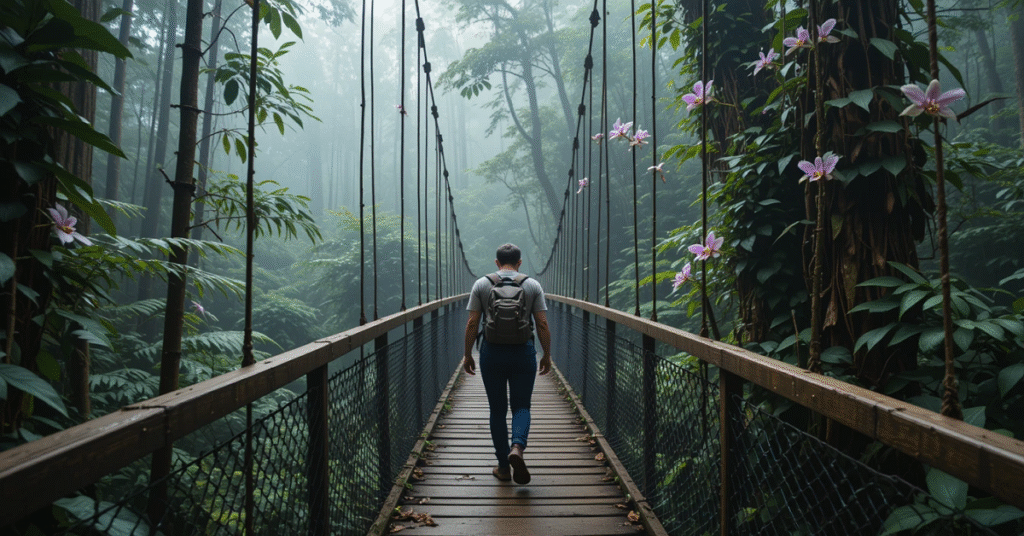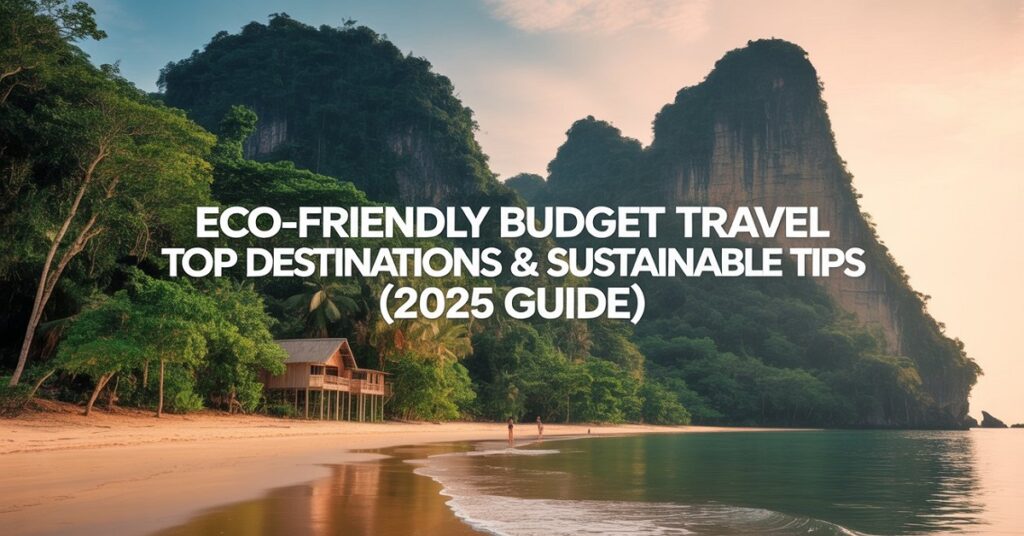You’ve seen the stunning photos on social media: lush rainforests, pristine beaches, and vibrant cultural landscapes. The urge to explore is undeniable, but it often comes with a nagging question: Can you afford to see the world without harming it?
The answer is a resounding yes.
Eco-friendly budget travel is not about expensive, exclusive retreats. It’s about making smart, conscious choices that lead to richer, more authentic experiences and—crucially—significant savings. This isn’t a trend reserved for the wealthy; it’s a practical approach for anyone who wants their travel dollars to support local communities and protect the very destinations we all dream of visiting.
This guide is your roadmap. We’ll show you actionable strategies, data-backed tips, and incredible, affordable green destinations. According to Booking.com’s 2023 Sustainable Travel Report, 81% of global travellers confirm that sustainable travel is important to them, and the world is rapidly adapting to meet this demand with budget-friendly options. By the end of this article, you’ll know exactly how to plan an adventure that’s kind to your wallet and the planet.
Table of Contents
What is Eco-Friendly Budget Travel?
At its heart, eco-friendly budget travel is a mindful approach to exploring. It’s about consciously minimising your environmental impact your carbon footprint while maximising your positive contributions to local economies, all while sticking to a budget.
It’s a win-win philosophy built on three core principles:
| Principle | How It Saves You Money | How It Helps the Planet |
| Use Less | Lower baggage fees from packing light and fewer purchases of disposable items like plastic water bottles. | Reduces plastic waste and conserves vital resources. |
| Travel Slower | Fewer expensive transportation tickets and access to long-stay discounts on accommodations. | Dramatically lowers carbon emissions from constant movement. |
| Support Local | Locally owned guesthouses and family-run eateries are almost always cheaper than international chains and tourist traps. | Your money directly supports the families and communities you’re visiting, fostering a healthier local economy. |
This isn’t about sacrificing comfort; it’s about being a smarter, more intentional traveller.
How Can I Travel Sustainably on a Low Budget?
This is the golden question, and the answer is simpler than you think. It boils down to a few key areas: how you get there, where you stay, and what you do.
Master Your Transportation (Without Emptying Your Pockets)
Transportation is often the largest contributor to a trip’s carbon footprint and its associated costs. Prioritising ground travel is your most powerful move.
- The Carbon Impact: A train journey from London to Paris, for example, generates around 14 kg of CO2 per passenger. The same journey by plane creates approximately 122 kg of CO2, nearly nine times more. Long-distance buses offer similar, if not greater, savings.
The Cost Trade-Off: When is a Flight Cheaper? Sometimes, budget airlines offer incredibly low fares that appear cheaper than train or bus tickets. While tempting, it’s crucial to weigh the true cost. That $30 flight might save you $20 in cash, but it costs the planet significantly more in emissions.
Key Tip: Always factor in the hidden costs of flying like expensive airport transfers and baggage fees—when comparing prices. Often, the train or bus is cheaper overall once you add everything up.
Your Sustainable Transportation Hacks:
- Embrace the Train: In regions with excellent rail infrastructure, such as Europe and East Asia, trains offer a fast, scenic, and environmentally friendly alternative to short-haul flights.
- Book Non-Stop Flights: If flying is unavoidable, choose non-stop routes. Takeoffs and landings consume the most fuel.
- Travel Off-Season: Fares for flights and trains plummet during the shoulder seasons.
- Local Transit is King: Once you arrive, use local public transportation. It’s cost-effective and offers an authentic glimpse into daily life.
Poll Results:
Total votes: 0
Find Affordable & Green Accommodation
The belief that eco-friendly lodging is expensive is a common misconception. In reality, budget options are often inherently more sustainable.
Your Strategy for Green Stays:
- Think Beyond Hotels: Locally owned guesthouses, homestays, and hostels have a much smaller environmental footprint and offer a direct connection to local culture.
- Use Sustainability Filters: Major platforms like Booking.com and Hostelworld have Travel Sustainable or similar badges that help you identify properties committed to eco-friendly practices.
- Look for Reputable Certifications: For extra confidence, look for eco-labels certified by the Global Sustainable Tourism Council (GSTC). These include standards like Green Key and EarthCheck, which verify a property’s commitment to sustainability.
- Embrace Unconventional Stays:
- Camping and Eco-lodges: Many national parks offer very cheap permits for camping.
- House-Sitting: Platforms like TrustedHousesitters offer free accommodation for looking after a pet or home.
- Farm Stays (WWOOFing): Volunteer on a farm for a few hours a day for room and board.
- [Traveler Testimonial]“I spent a month house-sitting in rural Portugal. I paid zero for accommodation, lived like a local, and had two lovely dogs for company. It was the most sustainable and affordable trip of my life.” – Chloe R., Green Traveller
Eat Well, Support Locals, and Save Big
Food is a huge part of the travel experience, and it’s one of the easiest areas to save money while making a positive impact.
Your Eco-Foodie Game Plan:- Dine at Local Markets: Street food stalls and local markets are where you’ll find the most authentic and affordable meals.
- Pack a Reusable Water Bottle: This is non-negotiable. Invest in a bottle with a built-in filter if you’re travelling to places where tap water isn’t potable.
- Carry a Reusable Toolkit: A reusable coffee cup, shopping tote, and a set of simple utensils can save you money and prevent a mountain of single-use plastic waste.
What Are the Best Affordable Eco-Friendly Destinations?
Ready for some inspiration? These destinations prove that a world-class, sustainable adventure doesn’t require a fortune.
1. Vietnam: Cultural Immersion in a Tiny Footprint

- Why It’s Great: With an incredibly low cost of living and a growing network of community-run homestays, Vietnam is a top choice for budget-conscious travellers.
- Eco-Activities: Explore the ancient town of Hoi An by bicycle, take a greener cruise in Ha Long Bay with a responsible operator, and support local ethnic communities on treks through Sapa or Ha Giang.
- Estimated Budget (2 weeks): A budget traveller can comfortably explore Vietnam for $400-$600, covering accommodation, food, transport, and activities.
2. Slovenia: Europe’s Hidden Green Gem

- Why It’s Great: A pioneer in sustainable tourism, Slovenia is a paradise of pristine lakes, lush forests, and the majestic Julian Alps.
- Estimated Budget (2 Weeks): Plan for around $800-$1,100 for a two-week trip, utilising hostels and local inns.
- Eco-Activities: Kayak on the emerald waters of Lake Bled, hike the breathtaking trails of Triglav National Park, and cycle through organic farms.
3. Costa Rica: The Original Eco-Tourism Powerhouse

- Why It’s Great: A global leader in conservation, Costa Rica is a haven for wildlife lovers and adventurers.
- Estimated Budget (2 Weeks): A budget-conscious trip will cost approximately $1,000-$1,400, staying in eco-lodges and eating at local sodas.
- Eco-Activities: Hike through the Monteverde Cloud Forest, spot monkeys and sloths in Corcovado National Park, and visit community-run hot springs.
4. Lesser-Known Gem: The Philippines (Palawan)

- Why It’s Great: While popular, Palawan is home to numerous community-based eco-tourism projects focused on preserving its stunning marine biodiversity. It offers incredible value away from the main tourist hubs.
- Estimated Budget (2 Weeks): Expect to spend around $700-$900, with costs dropping significantly if you stay in locally run guesthouses.
- Eco-Activities: Participate in a beach clean-up, take a community-guided boat tour in Port Barton that respects wildlife, and stay in locally owned bamboo bungalows.
Pro-Level Hacks for the Ultimate Eco-Budget Trip
Ready to take your skills to the next level? These advanced strategies will further reduce your impact and save you even more money.
Pack Light, Travel Far: The Art of the Minimalist Pack
Every pound counts on an airplane. Lighter luggage not only saves you from baggage fees but also reduces the plane’s fuel consumption.
- The Capsule Wardrobe: Pack 10-12 versatile, mix-and-match items in neutral colours.
- Solid Toiletries are a significant change: Shampoo bars, conditioner bars, and toothpaste tablets save space, eliminate leaks, and drastically cut plastic waste.
- The Multipurpose Secret Weapon: A large scarf or sarong can be a towel, a blanket, a dress, or a privacy curtain.
Key Tip Box: Embrace the Philosophy of Slow Travel.
The frantic, ten-cities-in-ten-days model is expensive and carbon-intensive. Slow travel is the antidote. By staying in one place longer, you dramatically cut transportation costs, unlock long-stay discounts, and build genuine connections with the local community.
Give Back with Volunteer Adventures
For the ultimate immersion, consider a work-exchange program.
- How it Works: Platforms like Worldpackers and Workaway connect travellers with hosts offering free accommodation (and sometimes food) in exchange for a few hours of work per day.
- Opportunities: You could find yourself helping at a jungle eco-lodge, a small organic farm, or a community-run school, turning your vacation into a meaningful exchange.
Common Mistakes to Avoid (and What to Do Instead)
Even with the best intentions, it’s easy to make a few missteps. Here’s how to navigate common pitfalls.
| Mistake | Why It’s Bad | The Smart Solution |
| Falling for “Greenwashing” | Many businesses use vague terms like “eco” without any genuine commitment to sustainable practices. | Look for proof. Ask direct questions about their waste and energy policies. Prioritise properties with official GSTC-recognised certifications. |
| Ignoring Local Customs | Being disrespectful, even unintentionally, can create negative experiences for you and the host community. | Do your homework. Learn a few basic phrases in the local language. Read about cultural etiquette regarding dress code and tipping. |
| Haggling Aggressively | Bargaining is part of the culture in many markets, but aggressive haggling over a few cents can be insulting to a vendor. | Keep perspective. Remember that the small amount you’re debating might be insignificant to you, but meaningful to the seller. Aim for a fair price. |
| Giving to Begging Children | While well-intentioned, giving money can encourage children to stay out of school and contribute to exploitation. | Support the community. Donate to a reputable local school or non-profit organisation that works directly with families in need. |
Your Journey Makes a Difference
Travelling responsibly is a powerful act. Every conscious decision you make—from taking a train instead of a plane to buying your lunch from a local market—sends a ripple of positive impact through the world.
By embracing eco-friendly budget travel, you are doing more than just saving money. You are enriching your own experiences, connecting more deeply with the places and people you visit, and casting a vote for a healthier planet and a more equitable tourism industry. You are proving that it is entirely possible to see the world, save money, and be a force for good.
What’s your number one tip for sustainable travel on a budget? Share it in the comments below to help fellow travellers on their journey!
Transparency, Disclosures
Destination Selection: The destinations in this guide were selected based on a combination of factors: overall affordability for budget travellers (daily costs for food, lodging, activities), strong evidence of sustainable tourism practices, and the availability of community-led or eco-friendly initiatives.
Affiliate Disclosure: This article may contain affiliate links. If you make a booking through these links, we may earn a small commission at no extra cost to you. This helps support our work in creating free, valuable content. We only recommend platforms and products we trust and use ourselves.
Franklin is a sustainable travel expert and content creator with over 12 years of experience exploring the world on a shoestring budget.

